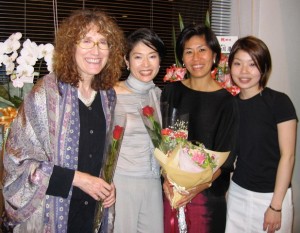This is a question that has been on my mind for near on three years now. Whether to self-publish the second to last book I wrote in Japan, or leave it in my computer, whispering shigata ga nai/it can’t be helped… sayonara.
It is a book I needed to write at the time. Now though, being no longer in Japan, I’m wondering about its relevance.
So I have drafted a new introduction. Will it do the job, I wonder? Are you titillated? Encouraged to read on beyond the first sentence, first paragraph? To be honest, I’m really not sure, really need to know:
Prelude
I’ve always been a more enthusiastic party-giver than party-goer. But there are exceptions. Which was why in late spring 2004, I was hanging out at a launch party held opposite the Korean Embassy in Moto-Azabu, Tokyo.
It celebrated the opening of a new kind of arts centre by three remarkable women, one Californian, one Japanese, and the third American-Thai-Filipino. It was a venue where anyone could learn to draw, sculpt, play the piano and journal visually via right-brain (as opposed to left-brain) techniques. Hence its curious name: RBR, for Right Brain Research.

A very happy day indeed! Left to right, Kristin, Mayumi and Lia at the launch of the RBR Center for Creative Arts, Tokyo (plus office staffer Kae)
On invitation, I began drop-in classes in creative writing based on experimental exercises that would trick left-brain – that masculine lobe that tells us we cannot write and never will be able to write so why bother to even try – into shutting up/down, so allowing feminine right-brain to function freely and intuitively.
We all used to be so much more right-brain before the macho Ancient Greeks got their reasoned hands on us, laid down the system of western-style education that is still followed today. Sadly the days when we communed naturally with the gods have given way to the three Rs and all the laws of logic and rationale.
By 2005, the classes I had initially offered through trial and error had evolved into an eight-week course. At the end of this, students asked when the next one would begin…
Today DRAWING ON THE WRITER WITHIN offers four levels: Initiation, Exploration, Affirmation and Confirmation.
The first three levels consist of weekly exercises followed by a 25 minute session of Proprioceptive Writing (http://radix00.com/PWriting_Main/) and omiyage, a Japanese word meaning obligatory gift. In this instance I give students the gift of a writing task to do in their own time at home ahead of the next session, to be shared – gifted back – for feedback by e-mail.
Level 4 is different. Students are asked to plan, develop and begin work on an 8-week project rather than weekly assignments. This is to encourage their own internal resources of self-discipline as writers. After all, at the end of this course, they are – theoretically at least – on their own.
To encourage them and – having spent years in journalism – plumb my own creative depths, I began a project of my own. The book that follows evolved from this self-imposed exercise.
I began it in 2010, by which time RBR had moved on to a new venue. This time around I was working with six women – American, Scottish and English DOTWW graduates –who had all completed the first three levels. I completed my own first draft a year later in 2011, by which time circumstances had changed.
While now a testament to the past, it remains as intensely personal and present as the time in which it was written. Welcome therefore to a love story about a house.
Angela Jeffs, Scotland, 2015


